Editor:
Brandon Sweet
University Communications
bulletin@uwaterloo.ca
Telling stories of Ukraine through photos
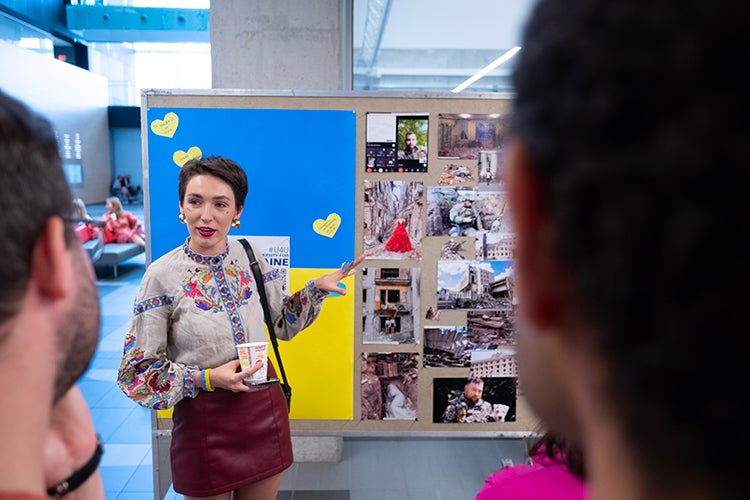
Last spring the University of Waterloo welcomed 34 students from Ukraine whose studies were interrupted by Russia’s invasion of their homeland.
Shortly after arriving on campus, the Ukrainian students created a collection of photos to highlight the impact the war was having on academics and civilians. Beginning with Engineering in July 2022, the Ukrainian students have partnered with each of the faculties and the Balsillie School of International Affairs to host an exhibit where they can share photos, stories and Ukrainian treats with fellow students, faculty and staff. Arts has the honour of hosting the final exhibit on campus on February 15 before it moves to Kitchener City Hall.
“The main goal of this exhibition is to make people aware what's happening right now and show the spirit of Ukrainians,” says Halyna Padalko, a graduate student who travelled here from Kharkiv. “Right now it's an emerging issue in the world, and we need to stay united together.”
The exhibit is also a way for the students to combat misinformation and the rise of anti-Ukrainian harassment on Canadian university campuses. With declining news coverage since the war began and the media’s focus on military support and larger scale politics, the students found that telling personal stories through the exhibit was a powerful tool to connect with people and foster solidarity. “It works more than if you just read some article … because you see a real person, and everyone has their own stories,” Halyna adds.
During the exhibit, students share stories and photos of civilians living without electricity under bombardment, professors volunteering in the army and giving lectures from their iPhones, a Eurovision song contest taking place in a subway station. A virtual reality display allows visitors to experience Ukraine before and after the war, and a set of headphones plays the sounds of Ukraine in real-time. “We were living the same life as people here, developing our country and ourselves, and one day (February 24, 2022) the life of every Ukrainian changed a lot. In our exhibition, we just want to show our resistance and resilience through [these] everyday routines.”
Halyna is currently studying in the MA Global Governance program at the Balsillie School of International Affairs and hopes to focus her research on Russian propaganda, using her knowledge and network here to support her country. In addition to attending the exhibit, she encourages people to show support through small acts of solidarity. “I believe this soft power will work,” she says. “If you just have a small Ukrainian flag at your workplace or at your residence or on your backpack, it will also raise awareness and you'll remind people about Ukraine, and that’s very impactful.”
Stories of Ukraine: A Student Photo Exhibit will be in the Hagey Hall Hub from February 13 to 17. Full event details.
Founders helping founders gives startups an advantage

By Natalie Grosman.
Startups are shaking the foundation of modern technology, searching for different and better ways to solve today’s problems and imagining different futures.
In addition to the knowledge and experience-sharing among current Velocity students and founders, Velocity's staff is unique in the number of alumni who have returned to help students and startup founders accelerate their ideas and ventures.
“I’ve been through a number of different incubators — but Velocity felt like home,” says Moazam Khan (BSc ‘16, MBET ‘17), director of Velocity Health and founder of health tech alum, Curiato, which won Velocity’s $25,000 pitch competition in 2016.
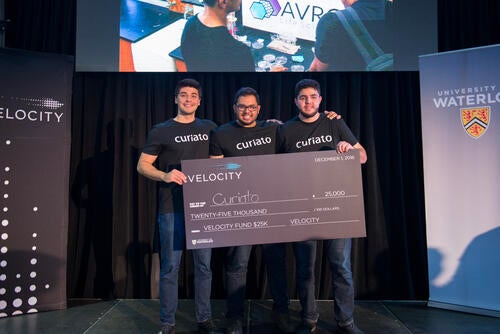
“The ecosystem is very well connected, you can walk up to any founder who will wholeheartedly help you out. You don’t find that in other places where founders are competing against each other.”
Since 2008, when Velocity started as a University of Waterloo residence, a thriving entrepreneurial network grounded in community has emerged.
Ross Robinson (BSc ‘11), Velocity Fund co-lead, lived in Velocity residence in 2009 and co-founded two Velocity alumni companies, Tinker and Willet. He says a founder-first philosophy has been a part of Velocity since its inception.
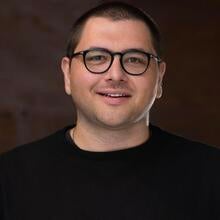
“Every decision we make revolves around how it affects founders. We constantly ask ourselves ‘is this founder-friendly, will they benefit’?” Robinson says. “That is something instilled from the original leaders of Velocity — when founders had a problem, they worked with us to solve it, no questions asked.”
Velocity’s institutional expertise helps students and founders navigate the nuances of entrepreneurship with experience and empathy. And those nuances are not always immediately obvious.
Akash Vaswani (BASc ‘14), Velocity Fund co-lead, is intimately familiar with the twists and turns of being a startup founder.
While living at Velocity residence, he won the $25,000 Velocity pitch competition and went on to co-found Tripzaar, one of the first five Velocity companies.
Vaswani says that for founders at the starting point of their journey, the full picture of the path ahead is unclear.
“Having a place where there is a cohort [of business advisers and directors] who have done it before, they can help look at various paths and change it early on potentially saving months of lost work,” Vaswani says. “That’s hard to do without having founder experience.”
And the potential pitfalls are many, right from the very start of the entrepreneurial journey.
Velocity has a rich presence on the University of Waterloo campus to help propel students’ ideas beyond initial phases.
For Krysta Traianovski (BSc ‘15, MBET ‘16), senior manager of Velocity Science, returning to work at Velocity is an opportunity to give back to students what she learned as co-founder of Velocity alumni company BrightGuide, which she originally pitched to Velocity during her studies.
A sudden interest in business and how it could be integrated with science was sparked during her co-op term. Back on campus, Velocity caught her attention and eventually opened her eyes to what being an entrepreneur means in practice.
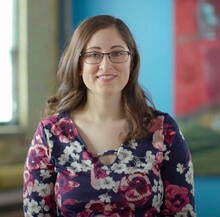
“What [founders] are learning is not just specific knowledge, it’s also a personal development process — changing their mindset,” Traianovski says. “Being an entrepreneur is taking action, exposing your ideas to the real world.”
John Dick, director of Velocity campus and co-founder of Velocity alum Nicoya, participated in Velocity Science, one of three student creator spaces.
After leaving Nicoya, Velocity’s culture and a pull to remain a part of it stood at the forefront. “I reflected on what I enjoyed most about working in a startup and it was that early-phase,” Dick says. “Knowing how Velocity operates and its startup mentality and culture really spoke to me.”
He said among undergraduates there is a real desire to solve large problems that the world is facing and imagine a different future.
“There's a lot of energy in this newest group of undergraduate students wanting to do something for sustainability and clean technology,” Dick says. “I’m excited for the opportunity to work with these teams and flesh out their ideas to find the best vehicle to make a positive impact.”
The appetite for innovation shows no sign of stopping, Velocity continues to evolve
The strength of Velocity company products and services continues to skyrocket, especially as broader societal influences impact innovation.
“When I was at Velocity in 2009, when someone raised a fundraising round, it was a big deal, now it has become routine,” Robinson says. “The level of maturity and potential of Velocity companies has improved overall — I’m constantly impressed by the founders.”
Trends in research commercialization are influencing the quality of today’s startups as is a broader support for innovation beyond educational institutions.
“There’s a new shift towards problem-oriented research rather than curiosity-based, a change towards encouraging researchers to move towards entrepreneurship,” Khan says. “And there are also professional organizations, like physicians' groups, that are providing consultation services to early-stage startups with product development — that was rarely seen five years ago, and that shift will really help.”
These shifts in trends and research are advantageous to startups and our collective futures but the heavy lifting of innovation and the changes the world needs to see remains on the shoulders of founders.
And having a good idea is only the start.
“If you want to make a big impact you need to consider implementation,” Dick says. “Solving a problem includes figuring out how you will remain viable over the long term.”
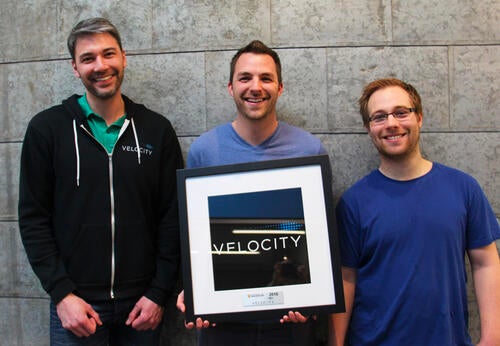
Execution speed and mastering the complexities of running a business are crucial, so too is keeping an eye on the big picture.
“Day-to-day you’re solving small problems for a few people and iterating,” Robinson says. “But ultimately you have to understand what that bigger picture is, what type of company do you want to run — what is your footprint on the world going look like?”
And tapping into an ecosystem of like-minded thinkers can go a long way towards success.
“Being around other founders, like at Velocity, is a big asset because you can find someone who is or has been in a similar position and ask them questions,” Khan says. “That can really help propel startups forward.”
The impact of founders helping founders goes beyond accessing necessary practical advice, Traianovski says. “It’s incredibly meaningful to hear from someone who really understands what you are going through during the transition from student to entrepreneur, from the smallest day-to-day challenges to the experience of changing as a person.”
Read how Velocity is building with optimism in 2023.
Courageous innovators must become champions of tech for good

This article is part of the Global Futures Innovation Update series.
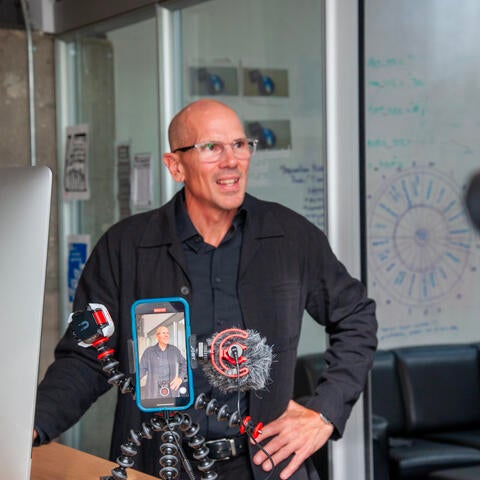
Dr. Marcel O’Gorman is a University of Waterloo Research Chair and founder of the Critical Media Lab. Strategically located in the heart of Waterloo Region’s tech hub, the lab is an interdisciplinary research initiative that explores the ethics and impact of technology on society and the human condition.
With innovations happening at a rapid pace, technologies are often adopted before the full impact on culture and human behaviours is understood. We asked O’Gorman how we should lead technological transformation to ensure a safe and human-centred digital future.
Opinion by Dr. Marcel O'Gorman:
The promise of tomorrow’s tech has inspired the imagination of every generation. It is said that we shape technology, and thereafter it shapes us. It is an understatement then to say that the stakes of future tech innovation are very high. Now and in our future, we can’t imagine our technological future without considering the broader social and environmental contexts of that future.
Waterloo has been a champion of innovation for years, and we continue to lead the way in Canada and beyond. Now we have a unique opportunity to be a champion — an exemplar, even — of responsible innovation.
A culture of responsible innovation needs to be rooted in sensitivity to human values, non-human stakeholders and a committed sense of care for the future. This is not just a technological challenge or a problem to solve. It’s about persistently asking the right questions: What kind of world do we want to live in? And who is “we” in the first place? Can our future technologies avoid replicating the social and environmental problems that are embedded in our current tech ecosystem?
Tech for good
There are many reasons to be concerned about our technological present: facial recognition interfaces that misrecognize black women; conflict minerals mined for circuit board components; the cloud’s obscene energy consumption; predatory data-gathering; and targeted “fake news” that fuels the fire of political polarity.
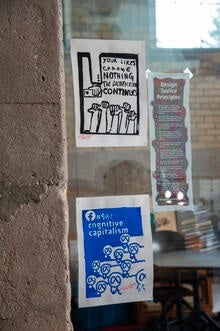
The tech community can do better, but only if it resists a profit-at-all-costs value system. This sort of retooling is a lot to ask, but our community is up to the challenge.
The phrase “tech for good” might bring to mind humanitarian technologies such as tech that supports a specific cause. But a commitment to “tech for good” means that all technology should improve life on earth, keeping in mind that “good” is a relative term that changes according to context.
Embedding a respect for variable contexts into the tech design process is the first step toward establishing a culture of “tech for good,” a culture that takes responsibility for the world it is building and carefully considers potential consequences of innovation — even if that might slow down the process. There is no room in responsible innovation for a “move fast and break things” mentality.
It’s time to put words into action
The technological change incubated in Waterloo region is enormous. Taking responsibility for the social and environmental outcomes of that change requires purposeful interventions. The Tech for Good Declaration, which I helped develop with Communitech and other partners, is a good first step. It’s time to put these words into action.
This is precisely why I founded the Critical Media Lab more than a decade ago. It provides a safe space to slow down and reflect on the impacts of technology. These projects range from the design of artistic “objects-to-think-with” that facilitate critical discussions, new policy formation and practical workshops in responsible innovation for startups, tech professionals and students.
We want to create a context for critical engagement, making room in the tech ecology for courageous innovators who will go beyond the design of good tech and strive to become champions of tech for good.
Student Experience Survey is open again and other notes
The Winter iteration of the Student Experience Survey kicks off this week. "Check your @uwaterloo.ca email or LEARN profile to see if you are one of the 10,000 randomly selected participants," says a note from the Survey Research Centre. "If you did not receive an invitation this term, you may receive one next time!"
Students who submit their survey will receive $5 added to their WatCard.
This voluntary and confidential survey is open from February 13 to March 3. For more information on the survey, visit the FAQ page at uwaterloo.ca/iap/winter2023ses or email srcccinb@uwaterloo.ca.
The Winter 2023 Student Experience Survey (SES) is administered by the University of Waterloo Survey Research Centre (SRC) in collaboration with the Institutional Analysis and Planning (IAP) department, the Associate Vice President, Academic, the Associate Vice President, Graduate Studies and Postdoctoral Affairs, the Keep Learning Team, and the Student Success Office (SSO). This survey is intended to be ongoing (once per semester), as a “pulse-check” for students and a way to gather feedback on strategic initiatives and to understand students’ learning environment and experience.
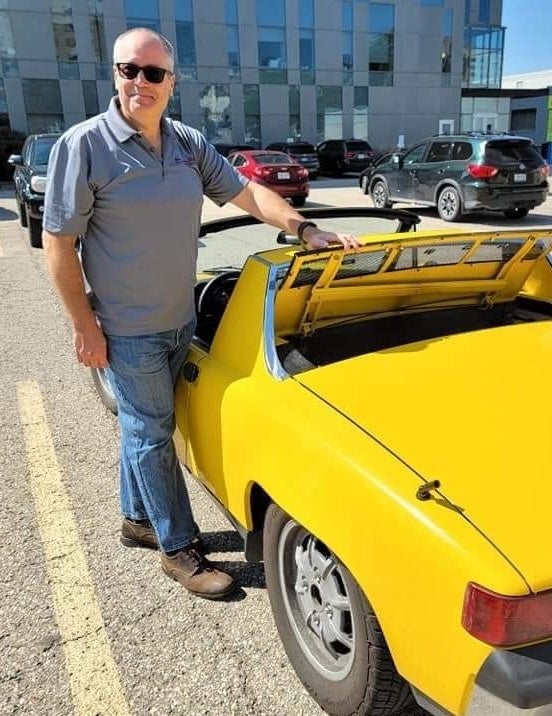
"The special tribute to the on-campus achievements of Michael Herz, a long-standing member of the Staff Association executive, is scheduled for Thursday,February 16, from 2:30 p.m. to 4:00 p.m. (hybrid format)," says a note from the University of Waterloo Staff Association (UWSA). "The online participants are invited to join via the MS Teams. Those of you who noted a preference for in-person participation are invited to join the gathering in EC1-1323 (the Collaboration Space inside the Games Institute)."
"If you had not had a chance to note your willingness to share a story about Mike, please consider presenting it yourself (online or in-person) during the event or to draft something ahead of time and have it read out to the attendees. In either case, please contact Agata Antkiewicz (ajantkiewicz@uwaterloo.ca) to note your willingness to participate in the storytelling."
"The in-person location of the event is equipped with commercial-grade HEPA filters and mask-wearing is encouraged."
"Please note that the opening of the event will include a smudging ceremony performed by the UW Office of Indigenous Relations as part of the Territorial Acknowledgement."
Link of the day
Cut the static: It's World Radio Day
When and Where to get support
Students can visit the Student Success Office online for supports including academic development, international student resources, immigration consulting, leadership development, exchange and study abroad, and opportunities to get involved.
Instructors looking for targeted support for developing online components for blended learning courses, transitioning remote to fully online courses, revising current online courses, and more please visit Agile Development | Centre for Extended Learning | University of Waterloo (uwaterloo.ca).
Faculty, staff, post-doc and graduate student instructors can find upcoming teaching and learning workshops, self-directed modules and recordings of previous events on Centre for Teaching Excellence Workshops and Events page.
Instructors can access the EdTech Hub to find support on Waterloo’s centrally supported EdTech tools. The Hub is supported by members of IST’s Instructional Technologies and Media Services, Centre for Teaching Excellence, Centre for Extended Learning and subject matter experts from other campus areas.
Supports are available for employees returning to campus. Visit IST’s Hybrid Work and Technology guidelines and workplace protocols to assist with the transition.
Students with permanent, temporary and suspected disabilities and disabling conditions (medical conditions, injuries, or trauma from discrimination, violence, or oppression) can register with AccessAbility Services for academic accommodations (classroom accommodations, testing accommodations, milestone accommodations).
Instructors can visit AccessAbility Services' Faculty and Staff web page for information about the Instructor/Faculty role in the accommodation process. Instructors/Faculty members are legally required to accommodate students with disabilities. AccessAbility Services (AAS) is here to help you understand your obligations, and to offer services and resources to help you facilitate accommodations.
Did you know that the Writing and Communication Centre offers many in-person and virtual services to support you with any writing or communication project? This term we've added The Write Spot: a new student space in South Campus hall, complete with bookable workspaces, drop-ins with our peer tutors, and free coffee and tea. We also have one-to-one appointments with our writing and communication advisors and peer tutors, email tutoring for grads and undergrads, drop-ins at Dana Porter Library, online workshops, writing groups, English conversation practice, and even custom in-class workshops. For any communication project, the Writing and Communication Centre is here to support you.
Research Ethics: Find yourself with an ethical question, unsure if your work requires an ethics review, or need advice about putting together a research ethics application? Reach out to one of our friendly staff by booking a consultation or email us with your questions.
Co-op students can get help finding a job and find supports to successfully work remotely, develop new skills, access wellness and career information, and contact a co-op or career advisor.
The Centre for Career Action (CCA) has services and programs to support undergrads, grad students, postdocs, alumni, and employees in figuring out what they value, what they’re good at, and how to access meaningful work, co-op, volunteer, or graduate/professional school opportunities. Questions about CCA's services? Live chat, call 519-888-4047, or stop by our front desk in the Tatham Centre 8:30 a.m. to 4:30 p.m., Monday to Friday.
Drop-in to in-person Warrior Study Halls on Thursdays from 5:00 p.m. to 6:30 p.m. in DC and DP. Join a Peer Success Coach to set goals and work independently or in groups each week.
Renison's English Language Institute continues to offer virtual events and workshops to help students practice their English language skills.
If you feel overwhelmed or anxious and need to talk to somebody, please contact the University’s Campus Wellness services, either Health Services or Counselling Services. You can also contact the University's Centre for Mental Health Research and Treatment. Good2Talk is a post-secondary student helpline available to all students.
The Library is here to help, both in person and online. Our spaces are open for access to book stacks, study spaces, computers/printers, and the IST Help Desk. For in-depth support, meet one-to-one with Librarians, Special Collections & Archives and Geospatial Centre staff. Visit the Library’s home page to access our online resources for anywhere, anytime learning and research.
The Faculty Association of the University of Waterloo (FAUW) continues to advocate for its members. Check out the FAUW blog for more information.
The University of Waterloo Staff Association (UWSA) continues to advocate for its members. Check out the UWSA blog for more information.
The Office of Equity, Diversity, Inclusion & Anti-Racism (EDI-R) works with students, faculty and staff across campus to advance equity and Anti-racism through evidence-based policies, practices and programs. If you have a concern related to Anti-racism and/or equity, please complete our intake form.
The Sexual Violence Prevention and Response Office (SVPRO) supports all members of the University of Waterloo campus community who have experienced, or been impacted, by sexual violence. This includes all students, staff, faculty and visitors on the main campus, the satellite campuses, and at the affiliated and federated Waterloo Institutes and Colleges. For support, email: svpro@uwaterloo.ca or visit the SVPRO website.
The Office of Indigenous Relations is a central hub that provides guidance, support, and resources to all Indigenous and non-Indigenous campus community members and oversees the University's Indigenization strategy.
The Waterloo Indigenous Student Centre, based at United College, provides support and resources for Indigenous students, and educational outreach programs for the broader community, including lectures, and events.
WUSA supports for students:
Peer support - MATES, Glow Centre, RAISE, Women’s Centre - Click on one of the links to book an appointment either in person or online for the term.
Food Support Service food hampers are currently available from the Turnkey Desk 24/7 in the Student Life Centre. Drop-off locations are also open again in SLC, DC, DP, SCH, and all residences.
Co-op Connection all available online.
Centre for Academic Policy Support - CAPS is here to assist Waterloo undergraduates throughout their experience in navigating academic policy in the instances of filing petitions, grievances and appeals. Please contact them at caps@wusa.ca.
WUSA Student Legal Protection Program - Seeking legal counsel can be intimidating, especially if it’s your first time facing a legal issue. The legal assistance helpline provides quick access to legal advice in any area of law, including criminal. Just call 1-833-202-4571.
Empower Me is a confidential mental health and wellness service that connects students with qualified counsellors 24/7. They can be reached at 1-833-628-5589.
GSA-UW supports for graduate students:
The Graduate Student Association (GSA-UW) supports students’ academic and social experience and promotes their well-being.
Advising and Support - The GSA advises graduate students experiencing challenges and can help with navigating university policies & filing a grievance, appeal, or petition.
Mental Health covered by the Health Plan - The GSA Health Plan now has an 80 per cent coverage rate (up to $800/year) for Mental Health Practitioners. Your plan includes coverage for psychologists, registered social workers, psychotherapists, and clinical counselors.
Dental Care - The GSA Dental Plan covers 60 to 70 per cent of your dental costs and by visiting dental professionals who are members of the Studentcare Networks, you can receive an additional 20 to 30 per cent coverage.
Student Legal Protection Program - Your GSA fees give you access to unlimited legal advice, accessible via a toll-free helpline: +1-833-202-4571. This advice covers topics including housing disputes, employment disputes, and disputes with an academic institution.
The Graduate House: Open Monday to Tuesday 11:30 a.m. to 7:00 p.m. and Wednesday to Friday 11:30 a.m. to 9:00 p.m. We’re open to all students, faculty, staff, and community members. The Graduate House is a community space run by the GSA-UW. We’re adding new items to the menu. Graduate students who paid their fees can get discounts and free coffee.
When and Where
Warriors Game Day Tickets and Season Passes, on sale now. Cheer on your Warriors W/M Basketball, Football W/M Hockey and W/M Volleyball teams at home during the 2022-23 season. Purchase today.
Fitness and Personal Training - Registrations opened January 5 this winter with Personal Training and Small Group Training as well as a Free Warrior Workout Program.
Student Health Pharmacy in the basement of the Student Life Centre is now offering Covid booster shots (Pfizer and Moderna) and flu shots. Call 519-746-4500 or extension 33784 for an appointment. Walk-ins always welcome.
Takin’ It To The Streets: La Cartonera Exhibit, Thursday, February 2 to February 13, Dana Porter Library lobby.
WaterLeadership: Sharing Science | Clear Language Writing, presented by Elisabeth Van Stam. Tuesday, February 14, 12:30 p.m. in DC 1304.
WISE Public Lecture, “FuelPositive's Containerized Green Ammonia Systems: Prioritizing Farmers and Food Security”, Tuesday, February 14, 1:15 p.m. to 2:15 p.m., EIT Third floor 3142., In-person & on Zoom. (additional details removed by request, 08/28/25)
TQT presents Keysight Lunch and Learn, Wednesday, February 15, 12:00 noon to 2:00 p.m., QNC 0101.
NEW - Tribute to Michael Herz, Thursday, February 16, 2:30 p.m. to 4:00 p.m., EC1-1323 and via MS Teams.
PhD oral defences
Chemistry. John Chow, “Temperature Programming of the Second Dimension in Comprehensive Two-Dimensional Gas Chromatography (GC×GC).” Supervisor, Dr. Tadeusz Górecki. Please visit the Faculty of Science Thesis Submission Notices website for details on requesting a copy. Oral defence Tuesday, February 14, 1:00 p.m., Chemistry 2 Building (C2) Room 361.
Biology. Nicole Dowling, “A structural investigation of novel fungal polyglycine hydrolases.” Supervisor, Dr. David Rose. Please visit the Faculty of Science Thesis Submission Notices website for details on requesting a copy. Oral defence Friday, February 24, 10:00 a.m., Biology 1 Building (B1) Room 266.
Physics and Astronomy. Jennifer Reid, “Magnetic Excitations in Transport Measurements of Novel Quantum Materials.” Supervisor, Dr. Robert Hill. Please visit the Faculty of Science Thesis Submission Notices website for details on requesting a copy. Oral defence Friday, March 10, 3:00 p.m., remote via MS Teams.
School of Pharmacy. Jiahao Huang, “In-solution and physical state properties of polymer and lipid excipients and their effects on the supersaturation revolution of poorly water-soluble drugs.” Supervisor, Dr. Shawn Wettig. Please visit the Faculty of Science Thesis Submission Notices website for details on requesting a copy. Oral defence Wednesday, March 15, 1:00 p.m., Pharmacy Building (